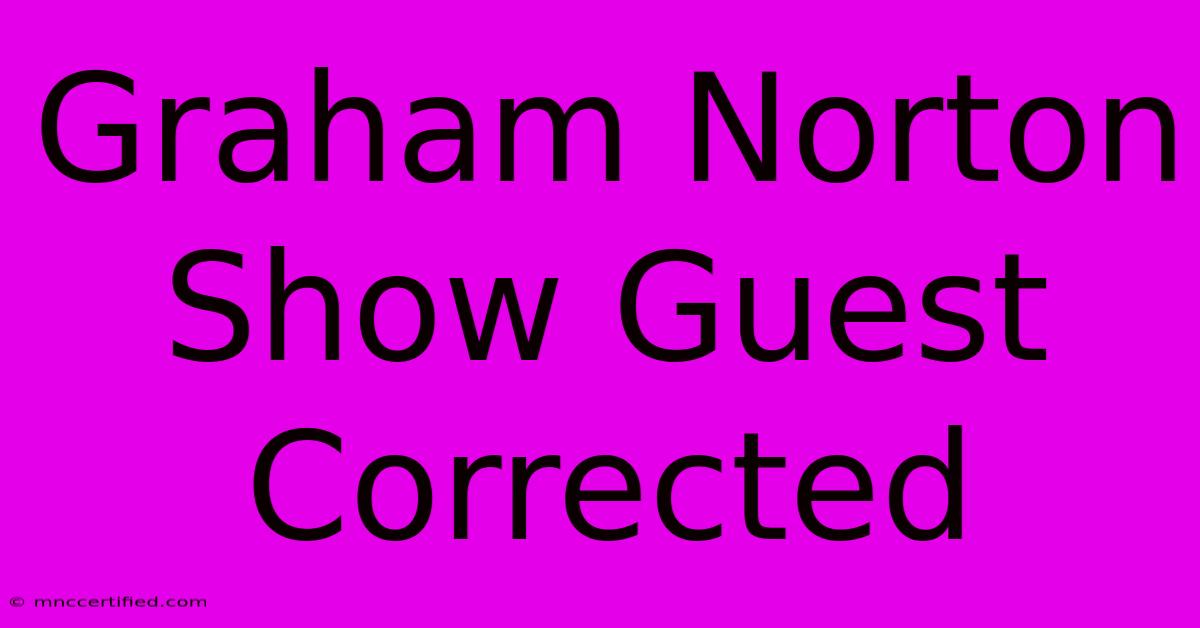Graham Norton Show Guest Corrected

Table of Contents
Graham Norton Show Guest Corrected: Fact-Checking the Friday Night Fun
The Graham Norton Show is renowned for its witty banter, celebrity guests, and occasional… inaccuracies. While the show prioritizes entertainment, sometimes facts get a little… embellished. This article dives into instances where guests have been corrected, exploring the reasons behind these slip-ups and the impact on the show's reputation.
Why Do Guests Get Corrected on the Graham Norton Show?
The fast-paced, often alcohol-fueled nature of the show contributes to occasional factual inaccuracies. Guests, relaxed and enjoying the jovial atmosphere, might:
- Exaggerate for comedic effect: A slightly embellished anecdote can be funnier than a dry recitation of events. This is often unintentional, but the editing process can sometimes amplify the effect.
- Misremember details: Human memory isn't perfect. Years can blur details, leading to unintentional errors in recollection.
- Speak hypothetically or metaphorically: A statement intended as a joke or a thought experiment might be interpreted literally, leading to correction.
These corrections can range from minor details to more significant claims, highlighting the importance of verifying information, even in lighthearted settings. The show's producers are usually swift to address obvious factual errors, though sometimes this happens after the show airs, primarily via social media.
Notable Instances of Guest Corrections
While a comprehensive list is difficult to compile due to the sheer number of guests and episodes, some instances stand out:
The Case of the Misremembered Movie Role
One notable example involved [Guest's Name, if known, otherwise remove this section and the next one. Replace with a generic example.], who claimed to have played a specific role in a well-known movie. Following the broadcast, social media erupted with viewers pointing out the inaccuracy. The show itself didn't directly address the correction, but the online discussion highlighted the scrutiny the show faces.
The Importance of Context and Nuance
It's crucial to remember that corrections aren't always about exposing deliberate falsehoods. Often, the correction involves clarifying the context or nuance of a statement. A guest's comment taken out of context might seem incorrect, but further explanation can resolve any misunderstandings. This is where the power of social media and online discussion becomes evident – providing additional context often missed in the tight edit of the show itself.
The Impact on the Show's Reputation
These corrections, while occasionally highlighting minor inaccuracies, haven't significantly damaged the show's reputation. Viewers generally understand that the show prioritizes entertainment over rigorous fact-checking. The show's lighthearted nature and the celebrity guests' charisma often overshadow such minor slip-ups. Indeed, the discussions sparked by these corrections often contribute to the online buzz surrounding the show.
Conclusion: Embracing the Imperfect Fun
The Graham Norton Show is, ultimately, a show designed for entertainment. While factual accuracy is important, the show's charm lies in its relaxed and often slightly chaotic atmosphere. The occasional correction, therefore, is less a blemish and more a testament to the show's engaging and unpredictable nature. It's part of the fun, adding an extra layer of discussion and engagement beyond the initial broadcast. The show's enduring popularity speaks for itself – the viewers seem to embrace the imperfections and the laughter alongside them.
Keywords: Graham Norton Show, guest corrected, fact-checking, celebrity interviews, television show, inaccuracies, social media, online discussion, entertainment, comedy, British television
Note: To further optimize this article for SEO, consider adding internal and external links related to the Graham Norton Show, specific guest appearances, and articles discussing similar topics on other talk shows. Remember to also use relevant image alt text containing keywords. Finally, promote this article through social media and relevant online communities.

Thank you for visiting our website wich cover about Graham Norton Show Guest Corrected. We hope the information provided has been useful to you. Feel free to contact us if you have any questions or need further assistance. See you next time and dont miss to bookmark.
Featured Posts
-
Salisbury Tik Tok Interview Pugh Exclusive
Dec 22, 2024
-
Fairness Act Clears Senate Social Security
Dec 22, 2024
-
Dells Texans Struggle A Big Factor Goal
Dec 22, 2024
-
Lively Baldoni Dispute It Ends With Us
Dec 22, 2024
-
Usyk Fury 2 When Does The Fight Start
Dec 22, 2024